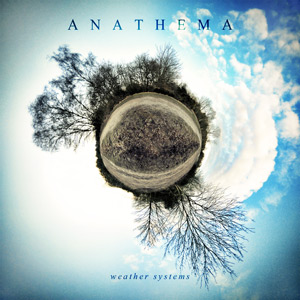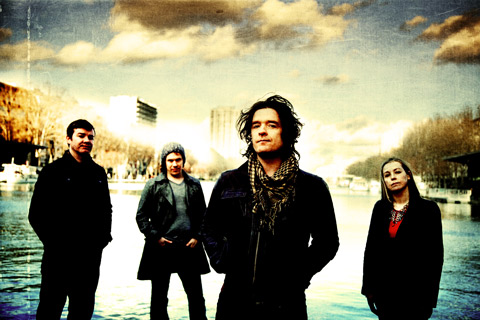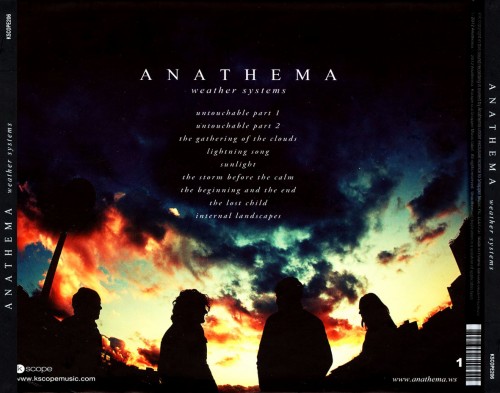IN 1977, paramedics rushed Joe Geraci, a soft-spoken, 42-year-old school administrator, to the emergency room after he broke into violent hemorrhaging in the wake of a recent operation.
Lying on a stretcher parked in the corner of the ER, Geraci felt his light fade as his wife Joan—a registered nurse—sat by his side. After saying goodbye to Joan, Joe closed his eyes and passed away.
Last year, Liverpool-based Anathema released their ninth studio album, Weather Systems, to a largely uninterested world. The one percent that did take notice however, could not be restrained; by all estimations, this record ranked among the very best in a long time.

Admiration was not relegated to any one genre; reviews poured forth from alt-music outlets, classic rock journalists, heavy metal magazines and of course, bloggers, each sending Weather Systems into to the highest tiers of their respective ratings systems. Beyond this tiny, impassioned faction, however, few were aware of the band, let alone its improbable masterpiece.
Formed in 1990 by brothers Vincent (vocals/guitar) and Daniel Cavanagh (guitar/vocals), Anathema are credited as influential pioneers of doom metal—a sub-genre of heavy metal marked by ponderous, grinding rhythms and cartoonishly spooky vocals. While the planet’s Top 40 stations were spinning acts like Oasis, Nirvana and the Cranberries, Anathema were writing music heavy enough to smother a black hole, which is one of the myriad reasons that their 2012 album is so notable—it sounds nothing like their debut.
Over the course of their next several studio outings, Anathema charted an audacious course away from doom metal and into positively euphonious waters. For those familiar with the band’s early efforts, the transformation was nothing short of mind-blowing. Picture Black Sabbath gradually morphing into a New Age band.
As the plodding riffage of their early 90s sound ceded to sparkling, elegiac melodies, Anathema released 2010’s We’re Here Because We’re Here, and the final stone seemed fit into place. Resplendent with sweeping chamber orchestration and dominated by piano, WHBWH yielded a disarmingly elegant clutch of hymns that signaled a creative end point of sorts and that suggested that Anathema had reached its pinnacle.
Then came their 2012 pièce de résistance: fifty-five minutes of celestial textures, explosive apogees and lyrics that hit like a two-by-four to the solar plexus. Anathema had not simply exceeded expectations; they had eviscerated them.
An arresting meditation on loss and death, Weather Systems relies on repeating acoustic patterns and atmospheric interludes to create a rhythmic ebb and flow that carries momentum from one track to the next. Handfuls of elements move between passages, often mirrored by different instruments or set against the raw, emotive poetry of Daniel’s lyrics. These recurring elements unify the album in such a way that in order to absorb the its full intensity, one must listen to Weather Systems in a singular, uninterrupted session. But man, what a payoff.
Openers “Untouchable,” parts 1 and 2, showcase how it all works. Part 1 features Daniel’s vocals, driven by an echoing acoustic melody as he struggles to let go of someone he desperately loves. The song refers to making a final statement of that love and blessing the beauty of the other person before letting go, and the lyrics are equally applicable to death as to any form of break-up or separation. Sadness, despair and defiance erupt and as his emotions take flight; the song gathers into a climax so powerful that its abrupt finish is startling.
In Part 2, the same melody is repeated on a piano and accented by strings. Singer Lee Douglas joins Daniel, offering a feminine take on what has been a decidedly masculine expression in the first part. The two trade verses and finally harmonize as the song moves to its own gut-wrenching conclusion.
While the Kübler-Ross stages of grief would hold that a consideration of death would end with acceptance, on Weather Systems, it marks an ambitious starting point. From that point flows a larger examination of spirituality and the relationship between our notions of life and loss. “Lightning Song,” “Sunlight,” and “The Beginning of the End” each explore enlightenment, emotions and the crippling fear of death.

Daniel has acknowledged that at the time he wrote these songs, Radiohead was in heavy rotation and this influence rings clearly in the way the songs build to such towering climaxes, à la “Fake Plastic Trees.”
Since man first explored the range of his vocal chords, there have been songs about death, with most of them leading to the trite exhortation to carpe diem, because you might as well have a few laughs before it all goes to shit.
Weather Systems brings its journey to a far more satisfying conclusion: in death, there is hope, and in its final track, this message issues from an unexpected source.
“Internal Landscapes” begins with soft, ethereal keys as a gentle voice begins speaking over the music in mid-sentence. It is Joe Geraci recalling his death, which lasted for nearly three minutes in that emergency room. He was revived, but not before having a profound spiritual experience while clinically dead.
It took Geraci several months to come to grips with what happened; he found himself unable to even tell his wife. Eventually he shared his near death experience (although he clarifies, “there was nothing ‘near’ about it”), and in this audio clip (culled from a 1981 interview), Geraci describes what happened on the other side—he experienced timelessness, love and a tremendous ease of letting go. Geraci saw his “life” on earth as a brief instant, “death” as infinite beauty and love as the bridge between the two.
“Internal Landscapes” is the fullest, most upbeat cut on the record—both lyrically and melodically—and with Geraci’s voiceover bookending the track, the effect is at once thought-provoking and immensely gratifying.
Weather Systems is one of those albums where you find yourself sitting in a silent room minutes after the music has stopped, still processing what just happened. To savor it from beginning to end is an experience that should not be missed and it offers an ideal companion for long drives and quiet Sunday mornings.





Yep, this band is amazing. How are they not bigger than a band like Muse?? They are fantastic, need to work on their international marketing for sure (from an Austalian Fan)
For example, you may write several articles for Associated Content that are
related to each other. I have just wasted over an hour
playing around with a new site – a new site that
I have no time to build. This plugin will help you by automatically
optimizing your titles so search engines can identify the
keywords people are searching in your title for each blog post.
My web blog internet